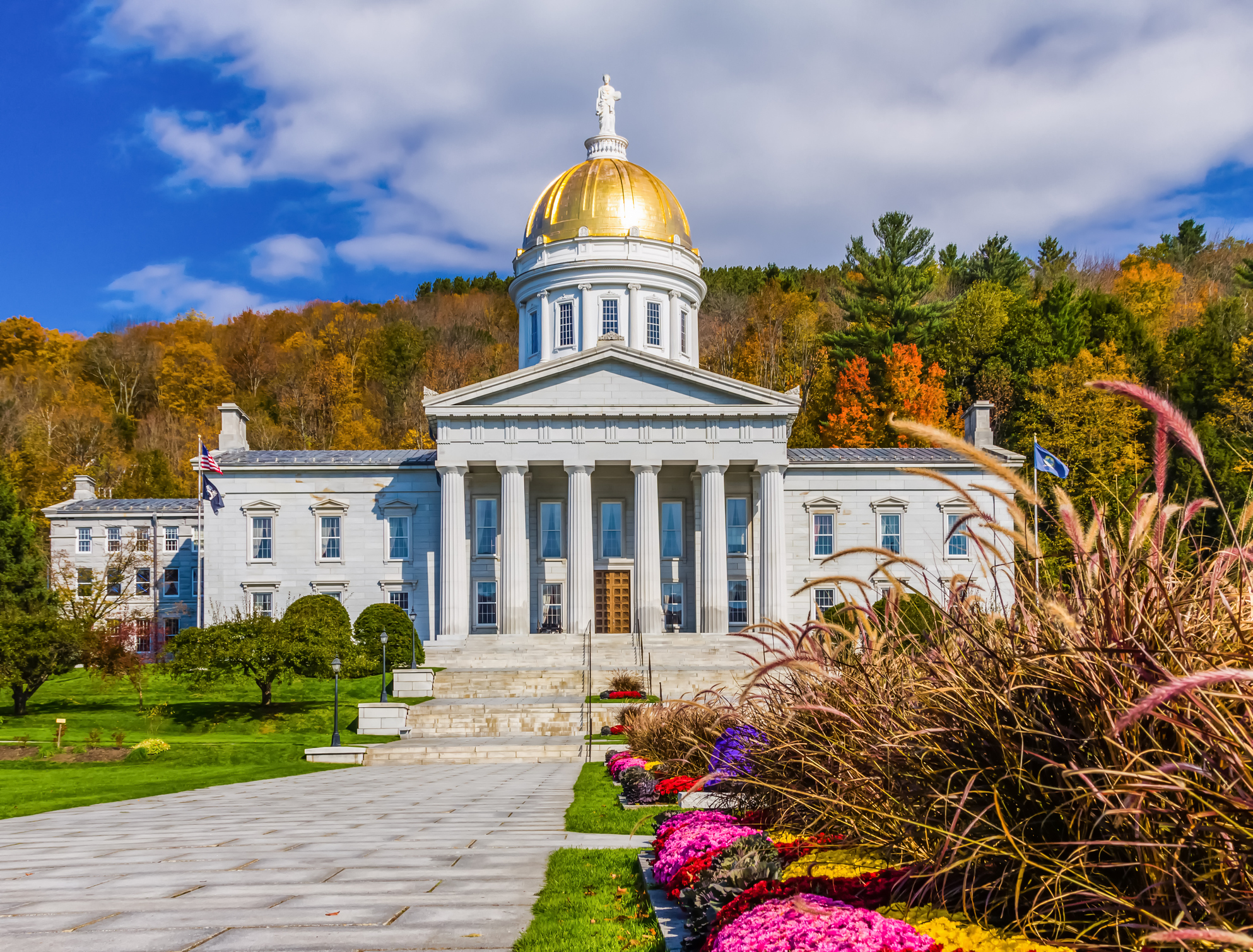Vermont Tax Guide
Explore Vermont's state tax rates for income, sales, property, retirement, and more. Learn how Vermont compares nationwide.

Kate Schubel

Profit and prosper with the best of Kiplinger's advice on investing, taxes, retirement, personal finance and much more. Delivered daily. Enter your email in the box and click Sign Me Up.
You are now subscribed
Your newsletter sign-up was successful
Want to add more newsletters?

Delivered daily
Kiplinger Today
Profit and prosper with the best of Kiplinger's advice on investing, taxes, retirement, personal finance and much more delivered daily. Smart money moves start here.

Sent five days a week
Kiplinger A Step Ahead
Get practical help to make better financial decisions in your everyday life, from spending to savings on top deals.

Delivered daily
Kiplinger Closing Bell
Get today's biggest financial and investing headlines delivered to your inbox every day the U.S. stock market is open.

Sent twice a week
Kiplinger Adviser Intel
Financial pros across the country share best practices and fresh tactics to preserve and grow your wealth.

Delivered weekly
Kiplinger Tax Tips
Trim your federal and state tax bills with practical tax-planning and tax-cutting strategies.

Sent twice a week
Kiplinger Retirement Tips
Your twice-a-week guide to planning and enjoying a financially secure and richly rewarding retirement

Sent bimonthly.
Kiplinger Adviser Angle
Insights for advisers, wealth managers and other financial professionals.

Sent twice a week
Kiplinger Investing Weekly
Your twice-a-week roundup of promising stocks, funds, companies and industries you should consider, ones you should avoid, and why.

Sent weekly for six weeks
Kiplinger Invest for Retirement
Your step-by-step six-part series on how to invest for retirement, from devising a successful strategy to exactly which investments to choose.
Vermont state tax: Overview
Vermont’s tax system can be a bit tough on some residents. The state has four income tax brackets and still taxes Social Security benefits for certain filers. Property taxes are on the higher side, and Vermont also has an estate tax to consider.
On the positive side, the sales tax rate is about average, and many everyday essentials are exempt, which helps soften the impact for shoppers.
[Data for this state tax guide was gathered from a number of sources including the Census Bureau, the state’s government website, the Sales Tax Handbook, and the Tax Foundation. Property taxes are cited as a rate percentage rather than the assessed value.]
From just $107.88 $24.99 for Kiplinger Personal Finance
Become a smarter, better informed investor. Subscribe from just $107.88 $24.99, plus get up to 4 Special Issues

Sign up for Kiplinger’s Free Newsletters
Profit and prosper with the best of expert advice on investing, taxes, retirement, personal finance and more - straight to your e-mail.
Profit and prosper with the best of expert advice - straight to your e-mail.
Vermont income tax

Vermont has a graduated state individual income tax rate ranging from 3.35% to 8.75%, according to the Tax Foundation.
Vermont retirement taxes
Vermont tax on retirement benefits: Social Security benefits are exempt for joint filers with an adjusted gross income (AGI) of $65,000 or less.
Additionally, Vermont offers a deduction of up to $10,000 for some types of retirement income. However, income requirements apply. Railroad Retirement benefits are tax-exempt in Vermont.
- Tax on Taxable Income: Low of 3.35% (on up to $45,400 for single filers and $75,850 for joint filers) and a high of 8.75% (on more than $229,550 for single filers and $279,450 for joint filers)
- Social Security: Partially taxable
- Pensions: Partially taxable
- 401(k) and IRA Distributions: Taxable
Vermont sales tax

Vermont's state sales tax rate is 6%. Localities can add up to 0.37% in additional sales taxes.
However, the average combined sales tax rate in Vermont is 6.37%, according to the Tax Foundation. Several types of products are exempt from sales tax.
- Groceries: Exempt
- Clothing: Exempt
- Prescription drugs: Exempt
How much are Vermont property taxes?

Vermont has an average effective property tax rate of 1.42%.
Vermont Property Tax Breaks for Retirees
Vermont offers a property tax credit of up to $8,000 to eligible homeowners. Homeowners must meet all of the following requirements to qualify for the credit in 2025.
- Your property must qualify as a homestead (as of April 1), and you must have filed a Homestead Declaration for the current year's grand list.
- You must have been domiciled in Vermont for all of the previous calendar year.
- You must not have been claimed as a dependent on a 2024 tax return.
- Your household income must not have exceeded $115,000 in 2024.
Vermont gas tax

Gasoline | $0.12 per gallon |
Diesel | $0.28 per gallon |
Vermont taxes on alcohol and tobacco
Product | Tax Amount |
|---|---|
Cigarettes | $3.08 per pack |
Cigars | $20-$40 per 10 cigars |
Tobacco/Snuff | $2.57 per ounce |
Medical Marijuana | 6% |
Recreational Marijuana | 20% (6% cannabis sales tax + 14% state excise tax) |
Source: Sales Tax Handbook
Product | Tax Amount |
|---|---|
Wine | $0.55 per gallon |
Beer | $0.26 per gallon |
Liquor | state-controlled |
Source: Sales Tax Handbook
Vermont estate and inheritance taxes
Vermont has an estate tax with an exemption of $5 million. The tax rate is a flat 16%.
Related Content
Profit and prosper with the best of Kiplinger's advice on investing, taxes, retirement, personal finance and much more. Delivered daily. Enter your email in the box and click Sign Me Up.

Katelyn has more than 6 years of experience working in tax and finance. While she specialized in tax content while working at Kiplinger from 2023 to 2024, Katelyn has also written for digital publications on topics including insurance, retirement, and financial planning and had financial advice commissioned by national print publications. She believes knowledge is the key to success and enjoys providing content that educates and informs.
- Kate SchubelTax Writer
-
 Quiz: Do You Know How to Avoid the "Medigap Trap?"
Quiz: Do You Know How to Avoid the "Medigap Trap?"Quiz Test your basic knowledge of the "Medigap Trap" in our quick quiz.
-
 5 Top Tax-Efficient Mutual Funds for Smarter Investing
5 Top Tax-Efficient Mutual Funds for Smarter InvestingMutual funds are many things, but "tax-friendly" usually isn't one of them. These are the exceptions.
-
 AI Sparks Existential Crisis for Software Stocks
AI Sparks Existential Crisis for Software StocksThe Kiplinger Letter Fears that SaaS subscription software could be rendered obsolete by artificial intelligence make investors jittery.
-
 How to Open Your Kid's $1,000 Trump Account
How to Open Your Kid's $1,000 Trump AccountTax Breaks Filing income taxes in 2026? You won't want to miss Form 4547 to claim a $1,000 Trump Account for your child.
-
 In Arkansas and Illinois, Groceries Just Got Cheaper, But Not By Much
In Arkansas and Illinois, Groceries Just Got Cheaper, But Not By MuchFood Prices Arkansas and Illinois are the most recent states to repeal sales tax on groceries. Will it really help shoppers with their food bills?
-
 7 Bad Tax Habits to Kick Right Now
7 Bad Tax Habits to Kick Right NowTax Tips Ditch these seven common habits to sidestep IRS red flags for a smoother, faster 2026 income tax filing.
-
 10 Cheapest Places to Live in Colorado
10 Cheapest Places to Live in ColoradoProperty Tax Looking for a cozy cabin near the slopes? These Colorado counties combine reasonable house prices with the state's lowest property tax bills.
-
 New Gambling Tax Rule Impacts Super Bowl 2026 Bets
New Gambling Tax Rule Impacts Super Bowl 2026 BetsTaxable Income When Super Bowl LX hype fades, some fans may be surprised to learn that sports betting tax rules have shifted.
-
 Should You Do Your Own Taxes This Year or Hire a Pro?
Should You Do Your Own Taxes This Year or Hire a Pro?Taxes Doing your own taxes isn’t easy, and hiring a tax pro isn’t cheap. Here’s a guide to help you figure out whether to tackle the job on your own or hire a professional.
-
 Can I Deduct My Pet On My Taxes?
Can I Deduct My Pet On My Taxes?Tax Deductions Your cat isn't a dependent, but your guard dog might be a business expense. Here are the IRS rules for pet-related tax deductions in 2026.
-
 Don't Overpay the IRS: 6 Tax Mistakes That Could Be Raising Your Bill
Don't Overpay the IRS: 6 Tax Mistakes That Could Be Raising Your BillTax Tips Is your income tax bill bigger than expected? Here's how you should prepare for next year.